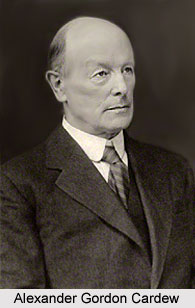 Sir Alexander Gordon Cardew KCSI, popularly known as Alexander Cardew, served as the Acting Governor of Madras Presidency in the year 1919, in the former undivided India under the rule of the British Empire. He was also a British colonial administrator. Cardew also served as one of the members of the British Indian Civil Service, which was the civil service of the Government of India during the era of the rule of British Empire in India. The members of the civil service were appointed under Section XXXII of the Government of India Act, 1858 of the Parliament of the United Kingdom. After the year 1886, the Indian Civil Service was officially known as Imperial Civil Service. He was honoured with Knight Commander of the Most Exalted Order of the Star of India (KCSI).
Sir Alexander Gordon Cardew KCSI, popularly known as Alexander Cardew, served as the Acting Governor of Madras Presidency in the year 1919, in the former undivided India under the rule of the British Empire. He was also a British colonial administrator. Cardew also served as one of the members of the British Indian Civil Service, which was the civil service of the Government of India during the era of the rule of British Empire in India. The members of the civil service were appointed under Section XXXII of the Government of India Act, 1858 of the Parliament of the United Kingdom. After the year 1886, the Indian Civil Service was officially known as Imperial Civil Service. He was honoured with Knight Commander of the Most Exalted Order of the Star of India (KCSI).
Early Life of Alexander Gordon Cardew
Alexander Gordon Cardew was born on 14 March 1861 in Bath, Somerset in the south west of England, as the eldest son of the Reverend J.W. Cardew. He completed his education from the Somersetshire College and The Queen`s College in Oxford. Cardew later joined as a member of the British Indian Civil Service in the year 1881.
Career of Alexander Gordon Cardew
Sir Alexander Gordon Cardew KCSI served as an Under Secretary in the Government of Madras from the year 1885 and retired from the position in 1890. He also acted as the Inspector General of Prison from 1892 till 1899. In the year 1906, Cardew was appointed as a member of the Madras Legislative Council and he served in the position till 1919. He was also in the Governor`s Executive Council between the years 1914 to 1919. Alexander Gordon Cardew was appointed as the Acting Governor of Madras on 29 March 1919 and was preceded by John Sinclair, 1st Baron Pentland.
The Madras Presidency, also known as the Presidency of Fort St. George and Madras Province, was an administrative sub division of British dominated India. The territory included most of southern India, such as the modern states of Tamil Nadu, the Coastal Andhra and Rayalaseema regions of Andhra Pradesh, Lakshadweep Islands, the Malabar region of North Kerala, Koraput, Malkangiri, Nabarangapur and Gajapati districts of southern Orissa and the Bellary, Ganjam, Dakshina Kannada, Rayagada and Udupi districts of Karnataka. Cardew served in office until 10 April 1919 and was succeeded by Major Freeman Freeman Thomas, 1st Marquess of Willingdon PC GCSI GCMG GCIE GBE.
Personal Life of Alexander Gordon Cardew
Alexander Gordon Cardew was married with Evelyn Roberta Firth in the year 1886. The couple had 2 daughters and 2 sons. He died on 12 January 1937 in Kensington, London at the age of 75, due to heart attack.



















